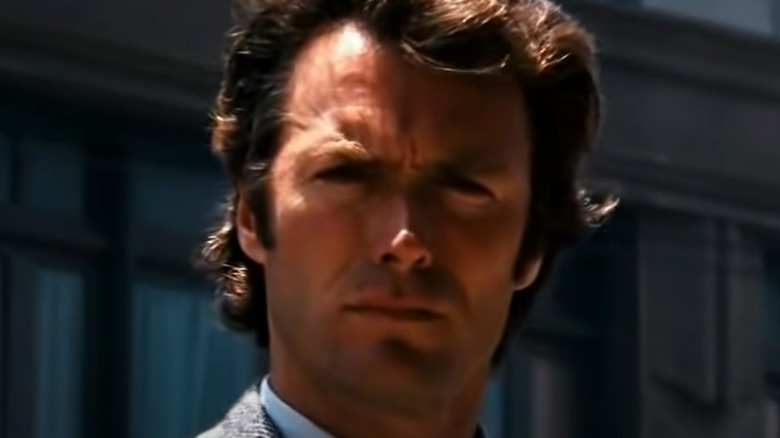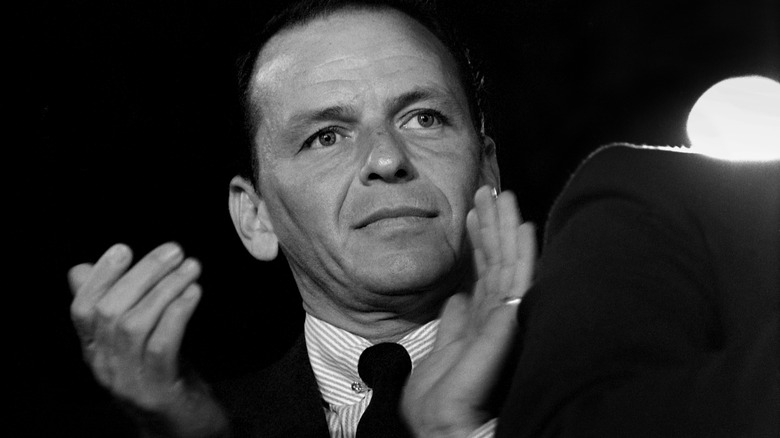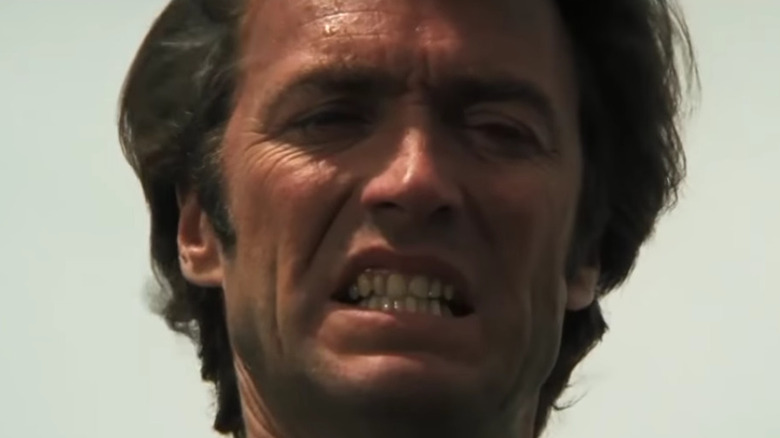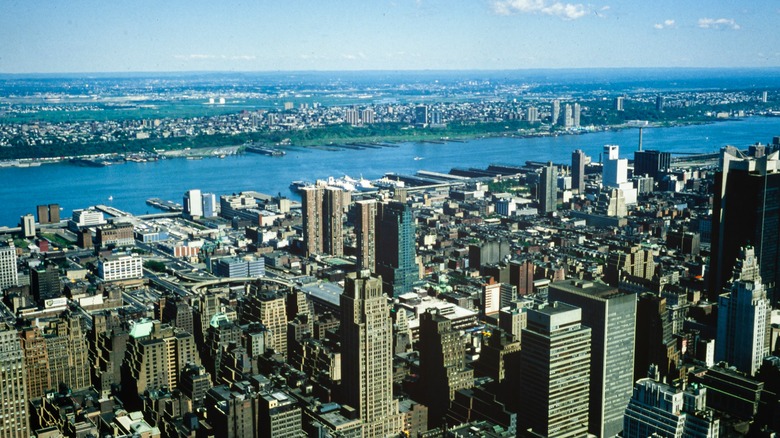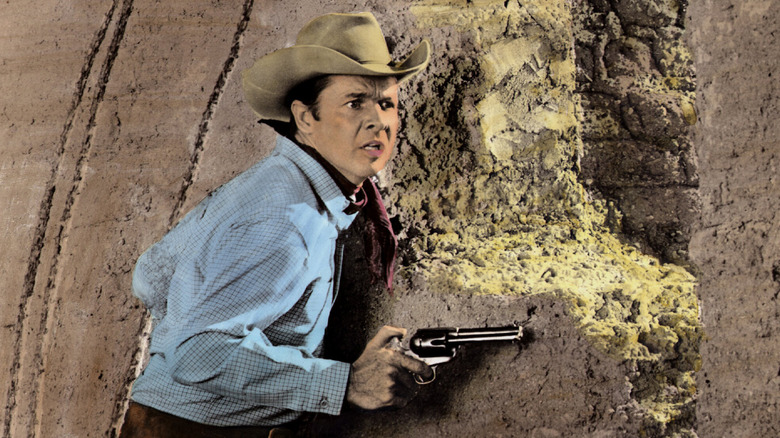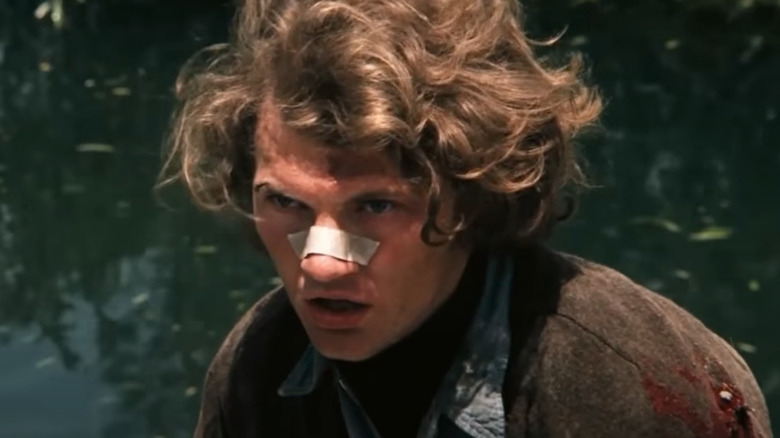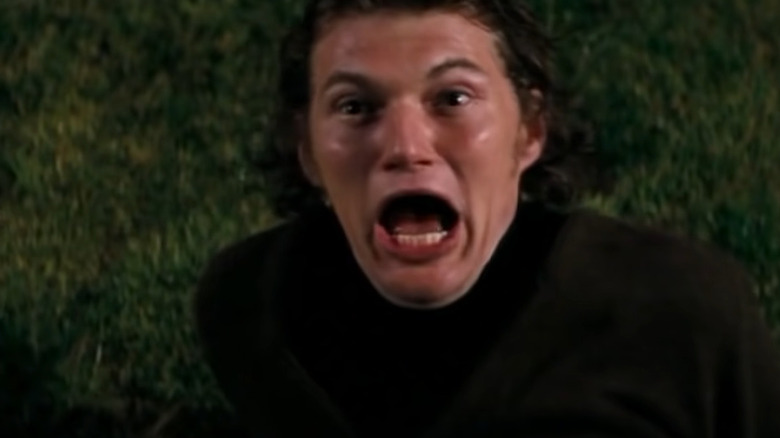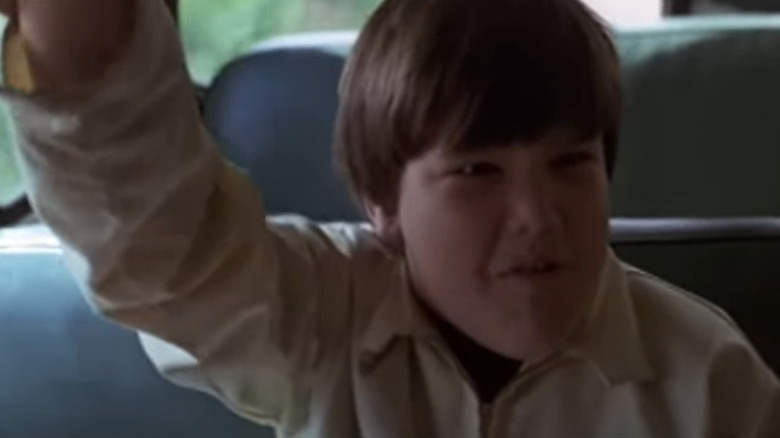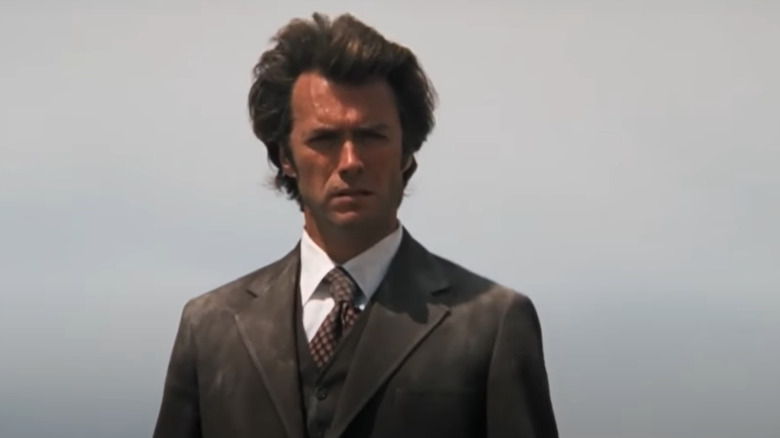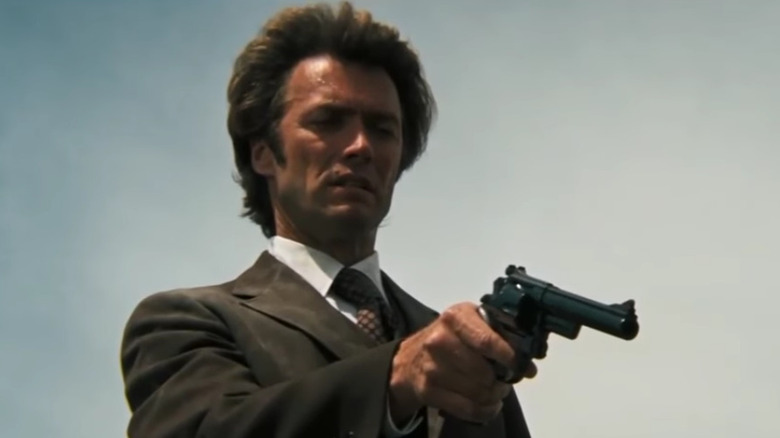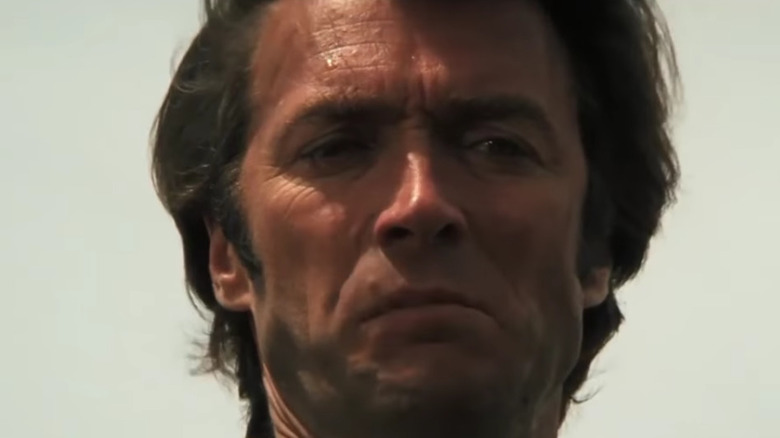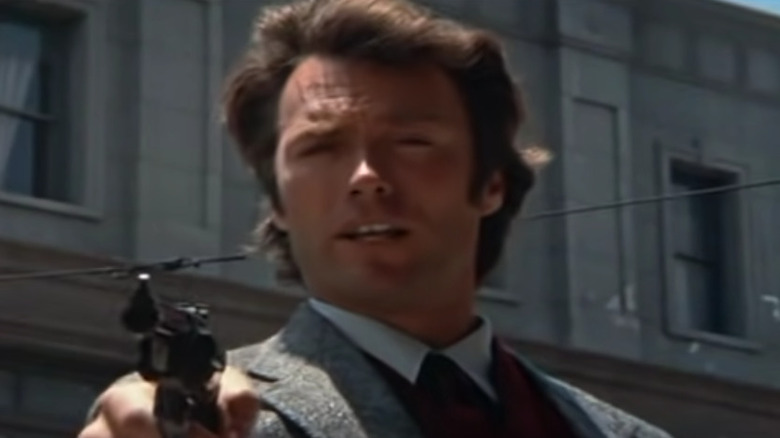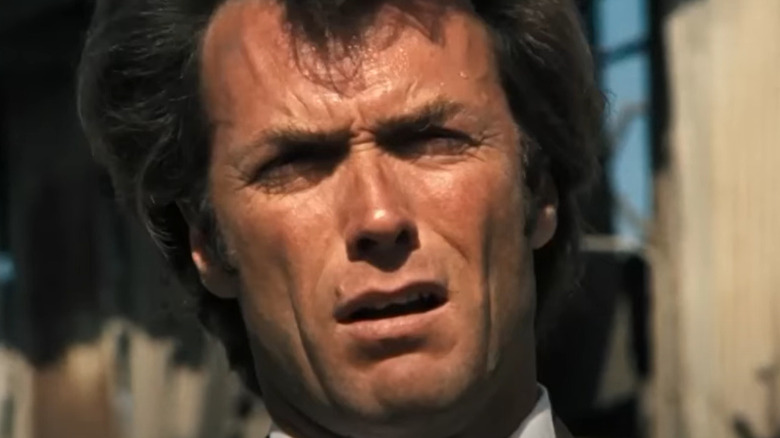The Untold Truth Of Dirty Harry
Some films give birth to characters whose larger-than-life personas are way too big to be confined by their first and last frames. Harry Callahan is one such man. When the anti-hero's hero exploded onto our screens like a bullet fired from the most powerful handgun in the world, it was a revelation. It's difficult to remember in the wake of maverick movie cops such as Martin Riggs from "Lethal Weapon" and John McClane in "Die Hard," but the initial impact that "Dirty Harry" had was immense. Portrayed with icy intent and charismatic aloofness by Clint Eastwood, the San Francisco cop plays hard and fast with the rules to get the job done — a trait that's earned him significant and understandable backlash over the years.
"Dirty Harry" wasn't Eastwood and director Don Siegel's first rodeo together, but it was definitely the one where the stars fully aligned. The uncompromising Callahan would rear his head again in the sequels "Magnum Force," "The Enforcer," "Sudden Impact," and "The Dead Pool," but none could quite match the high-octane style of the original. Not only did "Dirty Harry" have a memorable protagonist, but it also had an iconic villain in the Scorpio Killer (Andrew Robinson). With a great director at the helm, a tense script, and a band of talented actors on board, "Dirty Harry" quickly became a core piece of cinema history. Here are some things you might not know about the film.
Frank Sinatra could have been Dirty Harry
The character of "Dirty Harry" has always seemed to fit Clint Eastwood like an impeccably tailored suit, but the star was actually the last in a long line considered for the role. In an interview with MTV News, Eastwood discussed how the role came to him: "I guess they tried to get a lot of people for it. They tried Frank Sinatra and Robert Mitchum and Steve McQueen. Then they finally ended up with Frank Sinatra. I was in postproduction [on 'Play Misty for Me'], and they called up and asked, 'Are you still interested in 'Dirty Harry'?' I said, 'What happened to Frank Sinatra?'"
Eastwood was informed that Sinatra had sustained some manner of injury to his hand, which made him unable to hold a gun (a pretty big part of the role). "That sounded like a pretty lame excuse, but it didn't matter to me," Eastwood said. "I said, 'I'll do it.'" A version of the character played by Sinatra would surely have been quite different. Despite his massive star status, it's hard to say whether the film would have still had the same kind of cultural impact without Eastwood in the leading role.
Dirty Harry's famous catchphrase is almost always misquoted
Mention "Dirty Harry" to a certain subset of movie fans, and they'll likely respond with the classic "Do you feel lucky, punk?" catchphrase. The thing is, like "Mirror, mirror on the wall," "Play it again, Sam!" And "Beam me up, Scotty," Harry Callahan's famous line is nearly always misquoted. In the film, Harry doesn't actually say "Do you feel lucky, punk?" Instead, he waxes a lot more lyrical with the following: "I know what you're thinking. 'Did he fire six shots or only five?' Well, to tell you the truth, in all this excitement, I've kinda lost track myself. But being as this is a .44 Magnum, the most powerful handgun in the world, and would blow your head clean off, you've got to ask yourself one question: 'Do I feel lucky?' Well, do ya punk?"
It's a lot more to remember than the simple five words most people falsely remember, which is probably part of why the line gets misquoted so frequently. Incidentally, Harry Callahan's other famous quote, "Go ahead, make my day," which he first utters in "Sudden Impact," often incorrectly has the word "punk" added to the end. In Italy, a rough translation of the line was used as the title of the film itself.
Dirty Harry was originally set in New York
"Dirty Harry" is a nickname that definitely has a ring to it, but taken out of context, the moniker could just as easily imply something a lot more unsavory than a hard-nosed cop. That's probably why the film once had a less murky title, as well as a different setting.
Harry Callahan originally began as a character in a late 1960s screenplay penned by Harry Julian and Rita M. Fink, who'd written John Wayne vehicles "Big Jake" and "Cahill U.S. Marshall" together. Going by the working title of "Dead Right," the initial script centered around a jaded New York cop who was nearing retirement while obsessively tracking a dangerous serial killer. The screenplay ended up with Warner Bros. and eventually engaged the talents of "Apocalypse Now" screenwriter John Milius to revise it. When Clint Eastwood finally jumped on board, he recommended Don Spiegel as the director, who in turn helped bring in Dean Riesner for yet another round of rewrites. At long last, the version of "Dirty Harry" that would make it to theaters was ready for production.
Audie Murphy was originally meant to play Scorpio
For "Dirty Harry" to work, it needed a villain so evil that they'd make Harry Callahan look heroic by comparison. On paper, the Scorpio Killer was that villain. All that remained was for director Don Siegel to find the perfect actor to bring the brutal murderer to life, but one of his early choices wasn't exactly known for villainous roles.
A highly decorated World War II veteran and the star of numerous westerns, Audie Murphy was a strange choice for the role of Scorpio, but the one Siegel wanted nonetheless. because he was commonly typed as a hero, a villainous turn as the Scorpio Killer from Murphy would surely have shocked audiences. Sadly, Murphy lost his life in a plane crash before filming could commence. On a recommendation from his son, Siegel then looked into Andrew Murphy for the part (per Rue Morgue). That led to Clint Eastwood attending one of Murphy's plays, and ultimately to the young star being cast as the Scorpio Killer.
The Zodiac Killer was the blueprint for Scorpio
The Scorpio Killer doesn't have a huge amount of screen time in "Dirty Harry," but he certainly steals the show whenever he does pop up. He could be screaming like a man possessed or commenting on Harry Callahan's gun with the improvised, "Ooh, that's a big one," but he always hijacks the audience's attention like a wild pyrotechnic. From the opening shot where he kills a poor unfortunate with his sniper rifle to the moment Callahan kills him, Scorpio's presence haunts every frame of the film. It makes sense then that the villain was based in part on a real-life murderer — the Zodiac Killer, who went on a murdering spree in northern California during the late 1960s.
Like Scorpio, the Zodiac Killer taunted the police and seemed to enjoy playing cat and mouse with the authorities. However, unlike Scorpio, the Zodiac Killer was never identified or brought to justice. In an interview with Rue Morgue, Scorpio actor Andrew Robinson discussed the Zodiac influence and how the killer's anonymity made research for the role nigh on impossible. "I didn't do much, frankly, because so little was known of the Zodiac killer, beyond these cryptic notes he had left," Robinson said. "The only research I did was that I watched a lot of film noir." The actor also explained that he used the character's paratrooper boots and peace insignia belt buckle to build an internal backstory for Scorpio: "I decided that the character would be totally messed-up after serving in Vietnam."
Scorpio's actor was a committed pacifist
Getting into the mind of a killer and portraying them with conviction and realism is a big ask for any actor, but when it's one as sadistic and gleefully unrepentant as the Scorpio Killer, it's an even bigger challenge. "Playing someone who's insane is such a difficult thing, actor Andy Robinson explained in an interview with Rue Morgue. "You have to go there. When an actor is winking to the audience, then it just doesn't work." To make matters even harder, Robinson was a committed pacifist and extremely anti-guns, making him about as different from the character of Scorpio as possible.
Robinson has also revealed that his experience after "Dirty Harry" was released wasn't all great. "There were a few death threats," he told Rue Morgue. "There were a number of terrible things, like my wife answering the phone and getting the death threats." The actor claimed that people would approach him and pretend to aim a gun at his head while delivering Eastwood's famous "six shots or only five" monologue. "It just convinced me that acting is not such an innocent enterprise sometimes," he said. "It can really attract different kinds of people."
The kids on the bus are actually scared
One of the most harrowing scenes in "Dirty Harry" takes place when the Scorpio Killer hijacks a school bus full of children. From the moment he steps on board and snarls at the driver, a roller-coaster of high-tension terror begins. It starts peacefully enough with a sing-a-long of "Old McDonald," but by the time the kids are launching into a collective rendition of "Row, Row, Row, Your Boat," things are a little tense. Watching Scorpio suddenly change gears and rage at the kids on the bus is still chilling — particularly when he adds his own manic voice to the choir.
The kids' terror is palpable, but not just because they're first-class actors. According to Scorpio actor Andrew Robinson, director Don Siegel insisted that they continue shooting takes until the children appeared convincingly terrified. "Don said, 'You're not scaring them. And you've got to, or the scene won't work,'" Robinson told Rue Morgue. "So then I started screaming and singing those songs, and then the kids start to get scared and one of them started crying. I hope they're ok now." Needless to say, that kind of abusive directorial style (hopefully) wouldn't fly today.
Clint Eastwood did a lot of his own stunts
As an actor who's made a career playing tough guys, Clint Eastwood's has had some high standards to live up to behind the scenes. Along with the impenetrable squint, the slight air of amusement, and the voice that sounds like he eats rocks daily, Eastwood's actions often speak louder than his words, and that includes doing his own stunts. During filming for "Dirty Harry," Eastwood was busting the moves and risking life and limb while fellow daredevil thespian Tom Cruise was still dreaming of jumping out of planes and pulling off impossible missions.
Not only did Eastwood survive a plane crash, serve in the military, and save a man from choking, but he also performed his own stunts in films like "The Eiger Sanction," "The Gauntlet," "Magnum Force," and "Dirty Harry." The scene where Callahan jumps off of the bridge and onto the school bus hijacked by Scorpio is a prime example of Eastwood starring in his movie's biggest action moments. In an interview with The Independent, the star's longtime stunt double Buddy Van Horn commented on Eastwood's dedication to doing his own stunts. "I've tried to talk him out of it sometimes, but not very successfully most of the time," Van Horn said. "He went 'n' did 'em anyway, several of 'em. He's been banged up a few times."
The famous badge scene was almost cut
The final scene in "Dirty Harry" has Callahan shoot Scorpio before throwing his police badge into the same lake where the killer's body falls. The badge toss is a symbolic gesture and a fitting end to a movie that asks a lot of questions. Can the moment be interpreted as Callahan's frustration with a bureaucratic institution that fails innocent victims, and where justice is rarely served? Or maybe the hot-headed cop simply feels he's too much of a loose cannon to wear the badge any longer. If nothing else, it leaves the viewer intrigued. Yet if Eastwood had his initial way, the scene would have been scrapped.
In his autobiography "A Siegel Film," director Don Siegel writes that Eastwood originally didn't want to throw the badge (per B.U. Bridge). He was adamant that he didn't want the audience to believe that Callahan was quitting the force. Siegel explained to the actor, "You're not quitting. You're rejecting the bureaucracy of the police department, which is characterized by adherence to fixed rules and a hierarchy of authority. Eastwood still dug his heels in, though, and Siegel begrudgingly agreed that he could keep his badge in the scene. But right before shooting the scene, the star changed his mind, agreeing to toss the badge in the water, and the rest is history.
Finland initially banned Dirty Harry
It's safe to say that "Dirty Harry" wasn't exactly greeted with open arms upon its initial release. Its violent and morally ambiguous nature didn't sit well in the stomachs of many. Finland even banned the movie in February of 1972 due to its violent nature and mental health concerns. This led to a back-and-forth between the film's distributor and the Finnish government that lasted for months. Eventually, in 1973, an abbreviated cut of the film was released in the country.
Over 50 years after the initial ban, "Dirty Harry's" legacy of violent content remains complicated. Multiple real-life kidnappings and other crimes have been attributed as copycats inspired by the film, including a school abduction in Australia in 1972 and a 1976 ransom scheme in Chowchilla, California. Both cases involved groups of school students being kidnapped, though they also, fortunately, both ended in successful escapes. It seems like Finland may have had a point in banning "Dirty Harry" after all.
A Manila cop was once branded Dirty Harry
"Dirty Harry" gave a catchy name and a memorable face to the no-nonsense, loose-cannon policeman archetype. Harry Callahan's style of doing things may have often been beyond the pale, but he nonetheless became a cultural icon — to the point that the moniker has been applied to real-world cops.
Former mayor of Manila Alfredo Lim, who worked as a policeman before kickstarting his political career, was hailed in the Philippines as a real-life "Dirty Harry." In an article published by CNN Philippines after Lim's death, the former mayor is quoted as saying, "Black is black; white is white ... You have to know what's right or wrong — and then you act accordingly." Lim earned the nickname for his reputation for bravery and his record of dangerous gunfights. "Matching wits with criminals, you have to consider that they operate outside the law," he once said (per CNN Philippines). He's also quoted as saying that "the language known by criminals and law violators is force and violence. You cannot be soft to them."
The late officer and mayor certainly seemed to be an appropriate wearer of the Dirty Harry name. When asked if he was ever haunted by his past actions, Lim once replied, "My conscience is clear. We never engage first. It's either you or him. By law, you have to defend yourself." And as for the "Dirty Harry" tag, Lim was quoted as saying, "You can call me anything. I don't care."
Dirty Harry has been slammed as fascist
In his review of "Dirty Harry," Roger Ebert wrote, "The movie's moral position is fascist. No doubt about it." It's a claim that's been at the heart of a lot of "Dirty Harry" controversy for decades. famed "New Yorker" film critic Pauline Kael branded it "fascist medievalism" in a scathing review (via Scraps from the Loft). The critics weren't alone in condemning the movie as a glorified celebration of right-wing authoritarianism. During the Academy Awards, protestors waved banners proclaiming sentiments like "Dirty Harry is a Rotten Pig." Ultimately, though, the controversy didn't seem to bother director Don Siegel. In an interview with The New York Times, Siegel said, "I enjoy the controversy because if you make a film that's safe, you're in trouble." The director later added, "I don't make political movies. I was telling the story of a hard‐nosed cop and a dangerous killer. What my liberal friends did not grasp was that the cop is just as evil, in his way, as the sniper."
Clint Eastwood felt similarly about the response to the film. In an interview with MTV News, the star said, "People are always calling people names, the great right-wing conspiracy or the great left-wing conspiracy. You make a movie, and if somebody reads something into it, then great, more power to him." He added that "Don Siegel and I were both very moderate politically. We didn't think much of it. We just had a good time with it." Given Eastwood's politics and the enduring legacy of the film, it's no wonder that the true impact of "Dirty Harry" is still a matter of some disagreement.
